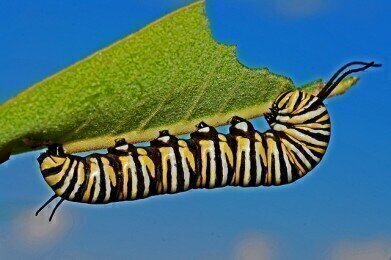Mass Spectrometry & Spectroscopy
Can Caterpillars Help with our Plastic Bag Crisis?
May 29 2017
Made famous by Eric Carle and Lewis Carroll, caterpillars harbour a relatively unhurried reputation. But now, a forward-thinking Spanish scientist is maintaining that the humble caterpillar could be the key to solving the world’s suffocating plastic bag problem.
Meet Federica Bertocchini, a professional developmental biologist and amateur beekeeper. She works at Cantabria’s Institute of Biomedicine and Biotechnology in Spain, and has some seriously avant-garde ideas when it comes to caterpillars. Essentially, it all boils down to the eating habits of waxworms. So how did she make the connection?
The very hungry caterpillars
As the larvae of the greater wax moth (aka Galleria mellonella), hungry waxworm caterpillars thrive on beeswax. When carrying out her duties as a hobbyist beekeeper, Bertocchini noticed that her empty hive boxes were infested with the larvae. She set to work cleaning out the boxes, and banished the waxworms to a plastic grocery bag. To her surprise, the waxworms quickly nibbled their way out of the bag and left a smattering of holes in their wake.
"I removed the worms, and put them in a plastic bag while I cleaned the panels,” she recalls. “After finishing, I went back to the room where I had left the worms and I found that they were everywhere. They had escaped from the bag even though it had been closed and when I checked, I saw that the bag was full of holes. There was only one explanation: the worms had made the holes and had escaped. This project began there and then."
Stomachs of steel
After conducting initial research with her team, she discovered that waxworms are armed with stomachs of steel. Unlike other organisms, the caterpillars are able to break down the polyethylene found in plastic, and convert it into ethylene glycol. The team suspects that this is because the composition of beeswax is similar to that of polyethylene.
"We still don't know the details of how this biodegradation occurs, but there is a possibility that an enzyme is responsible,” explains Bertocchini. “The next step is to detect, isolate, and produce this enzyme in vitro on an industrial scale. In this way, we can begin to successfully eliminate this highly resistant material.”
A polyethylene breakthrough?
This is a milestone finding, as polyethylene is notoriously hard to break down. And given the fact that the world produces 80 million tons of polyethylene a year and goes through more than a trillion plastic bags, it poses as a big recycling challenge.
The findings were published in Current Biology, and created a global buzz within the environmental science sphere. According to Bertocchini and her team, 100 wax worms are capable of biodegrading 92 milligrams of polyethylene in 12 hours, which is exceptionally fast. With the right development, Bertocchini maintains that the unassuming lepidopteran insects could serve as powerful polyethylene bio-degradation armies.
The world faces an onslaught of environmental challenges, and science will inevitably play a critical role in protecting the planet for future generations. ‘Leaf Polyphenols as Indicators of Climatic Adaptation of Beech (Fagus sylvatica L.) – an HPLC-MS/MS via MRM Approach’ spotlights another pressing issue, and introduces the HPLC-MS/MS technique as a potential solution for saving fragile species like the Fagus sylvatica L beech tree from possible extinction in the wake of climate change.
Digital Edition
Lab Asia 31.2 April 2024
April 2024
In This Edition Chromatography Articles - Approaches to troubleshooting an SPE method for the analysis of oligonucleotides (pt i) - High-precision liquid flow processes demand full fluidic c...
View all digital editions
Events
Apr 28 2024 Montreal, Quebec, Canada
May 05 2024 Seville, Spain
InformEx Zone at CPhl North America
May 07 2024 Pennsylvania, PA, USA
May 14 2024 Oklahoma City, OK, USA
May 15 2024 Birmingham, UK


















